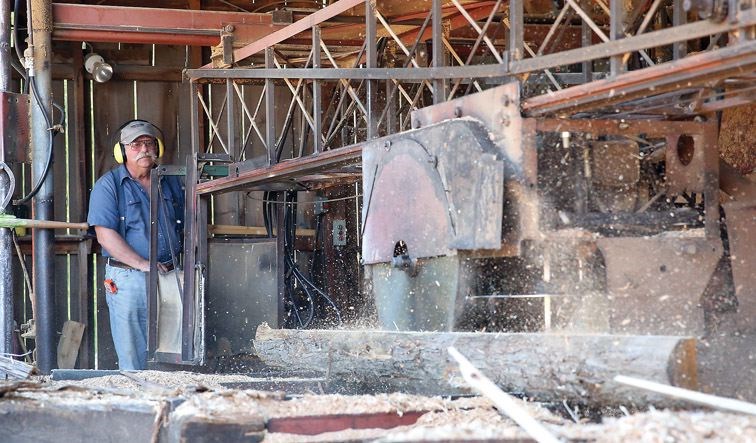Iridescent-yellow earmuffs protect the ears of the sawmill owner who's coming from his lumberyard loader.
As he slips off the neon-coloured hearing protection, Leonard McCarty, 68, raises his head, a cautious smile turning up the corners of his mouth to match the angle of his handlebar moustache.
A work-toughened hand reaches out in greeting. There's an unmistakable rasp of fingers that have worked with lumber and steel for more than 50 years. These are the only hands that have shaped the wood used to construct the Ancient Forest boardwalk created at his one-man mill operation in McBride.
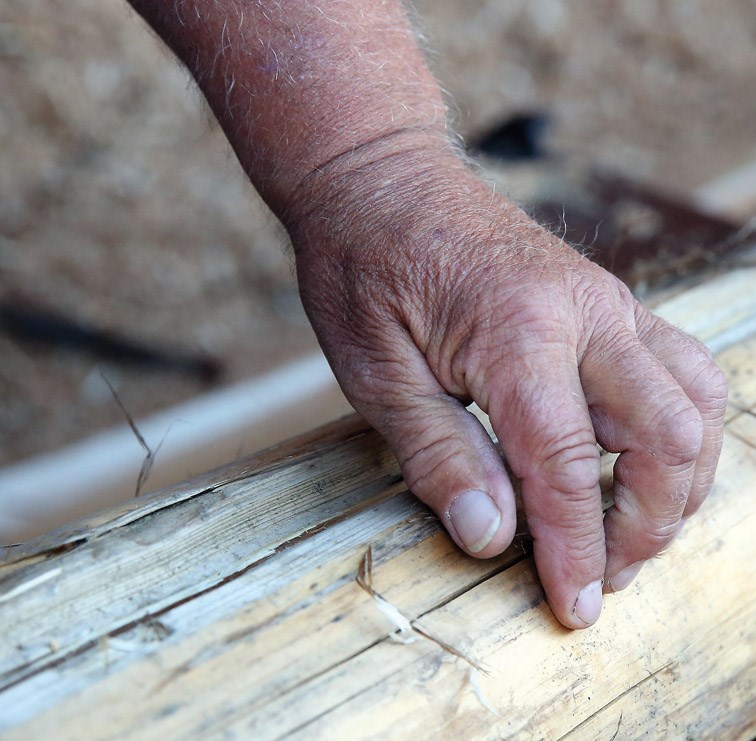
"When we first started building the universal boardwalk we had nothing materially to speak of - we had a chainsaw, a hammer, a few nails and high hopes," said Nowell Senior, who was inspired to build the boardwalk so people with disabilities could access the Ancient Forest site.
"McBride Community Forest donated about $3,000 worth of lumber to get us started and from there on we always had enough funding to purchase what we needed," said Senior. "We've actually purchased more than $90,000 worth of lumber from a one-person mill in McBride."
That's where McCarty and his solo operation, Midget Mills, comes in.
"He's cutting those logs into lumber one cut at a time," said Senior. "You can hear this loud noise taking place in this shed and you walk around to the front of it and you see him there and it looks like something from the Middle Ages in a way and it works and he's cutting those logs into lumber and I don't know how many boards he's cut for the Ramblers (for the Ancient Forest boardwalks) - maybe 6,000 boards, maybe more I've lost count - and I know he's cut 60 tons of lumber and that was just for the universal boardwalk and it's pretty close to the same amount for the current planked pathway we're building. That's a 120 tons of lumber cutting one board at a time."
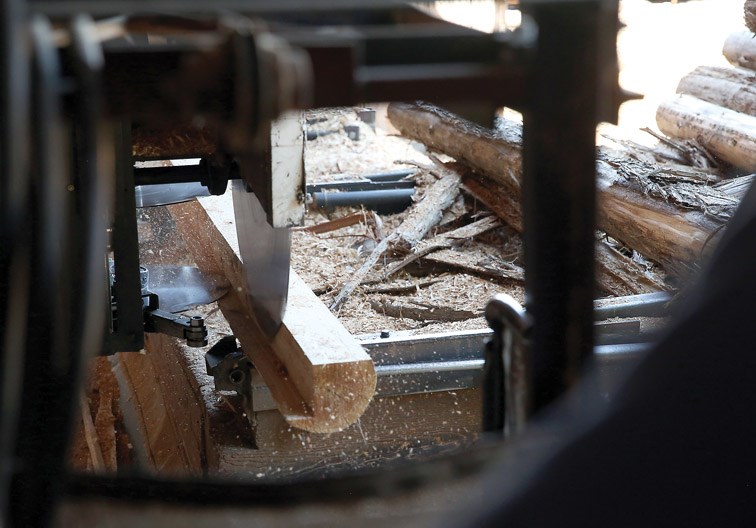
When McCarty got the work order he wasn't sure what it was going to be used for, he recalled.
"I had a look at the list of lumber needed but I didn't imagine that he was going to make this walkway that wound through the forest like that," said McCarty.
"You don't very often see that. I knew from the start that he wanted to use wheelchairs on it so I had an idea it had to be almost level. It was neat, but I was thinking of it as a way for people to see what's just as common as all get out to me.
"I think that Nowell is maybe the most persistent person I have ever met and he has done a tremendous amount of work and his goal is a wonderful goal," said McCarty about making the boardwalks that provide accessibility at the Ancient Forest.
The Ancient Forest boardwalk was created with 4x4s, 2x6s and 2x8s. There was some bracing of 3x3s and 2x3s and all of the pathway that's being built now is 2.5x8s and 4x4s to go underneath it, he explained.
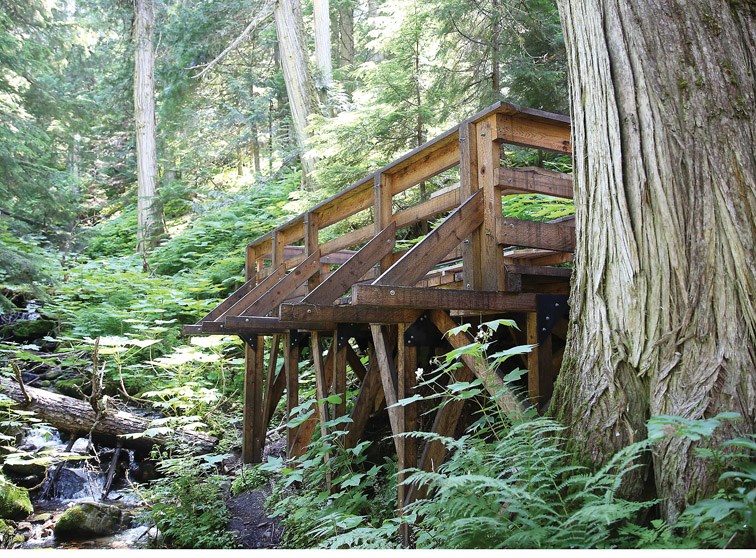
"It's a big geometry problem," said McCarty. "You're making something square or rectangular from a round log so you're always trying to block it out. To boot, in cedar you've got a hole in the middle. Not always, but you always have to work with the idea that you may have rot in the middle. So you always look at all the logs and think 'oh, I might get away with it this time,' because once you cut that board the value judgment has been made right there. Cedar is the thing that's chucked out because nobody else wants it. There's very little of it."
Knowledge and experience help McCarty make those choices.
"We started sawing lumber in 1972," he said, talking about working with his dad, Melvin, who has since died. "But the main source of income was farming."
McCarty was logging with a skidder and a Cat.
"I don't think that type of logging show exists anymore," said McCarty, who has been at the mill alone for the last 20 years.
They couldn't sell the logs so they had to process it into lumber.
"You can always sell lumber but you have to be patient like a farmer because you only get paid once a year," McCarty smiled.
"There's no getting paid every two weeks - every small business man will tell you that."
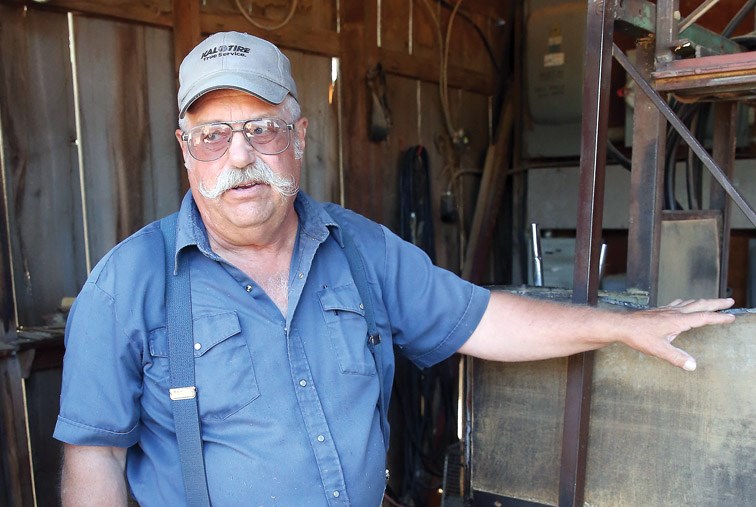
The finances aren't the only challenge. Even small jobs at Midget Mills can take a lot of work.
McCarty had a man call him up who needed 320 12-foot long boards to make a deck.
"He said 'I suppose that's just nothing to you' - but that's a lot for me," said McCarty. "People don't have a concept of there being a tiny little mill - mills are these things you drive by with monstrous equipment working and that's the tough thing. People don't recognize that there's little mills 'cause usually they're hidden away somewhere. Nobody sees them."
Nobody sees the rotten cedar tucked away in the Robson Valley, and McCarty said it's like looking for gold.
"We know that the logs are rotten and we start looking for a good piece."
McCarty has different feelings about how any land in the McBride area has been developed and designated and he believes many parts of the region has got the same characteristics as what can be seen at the Ancient Forest.
"I've been in this business a long time - I started logging in about '63 when I was a teenager and this valley has lost, and lost, and lost and lost and we lost some more," said McCarty. "And this has gone on and on. I'm a farmer. Land is to be taken care of very, very, very carefully and it should be studied and analyzed and now what can we do that's the very, very best with this property - what is the very best and once it's in a park you make no more decisions about it. It's gone. Gone."
"When they decided to make Mt. Robson a park and if they extended it here, we wouldn't be talking," said McCarty.
His land and McBride would be part of the provincial park.
Look at Mt. Robson, said McCarty.
"If you want a park, you should be proud of your park and you should hire enough people to take care of your park," said McCarty.
"There's no pride in it. If you're going to take something, you better take care of it as good as I do."
